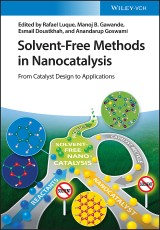Details

Solvent-Free Methods in Nanocatalysis
From Catalyst Design to Applications1. Aufl.
|
133,99 € |
|
| Verlag: | Wiley-VCH |
| Format: | EPUB |
| Veröffentl.: | 11.01.2023 |
| ISBN/EAN: | 9783527831470 |
| Sprache: | englisch |
| Anzahl Seiten: | 352 |
DRM-geschütztes eBook, Sie benötigen z.B. Adobe Digital Editions und eine Adobe ID zum Lesen.
Beschreibungen
<b>Solvent-Free Methods in Nanocatalysis</b> <p><b>Discover solvent-free approaches for the synthesis of nanocatalysts as well as various catalytic transformations in this unique one-stop resource</b> <p>Solvent-free methods have attracted wide attention in organic synthesis and catalysis as a promising approach towards “greener” and more sustainable chemical transformations. In this regard, nanocatalysis has seen particular growth in recent years. <p><i>Solvent-Free Methods in Nanocatalysis</i> gives an in-depth overview of nanocatalysts and their catalytic applications using solvent-free methods. After a brief introduction, it covers various synthetic techniques for the preparation of nanocatalysts and supports using solvent-free methods, e.g. ball-milling, microwave- and plasma-assisted methods. The book discusses in detail different catalyst classes, such as metal oxides, doped and functionalized nanocarbons, as well as nitride- and silica-based materials to help researchers to understand the efficiency and nature of these catalysts/supports based on their chemical structure. In the book readers will also find: <ul><li>A brief account of the history, challenges, and recent advances in the field </li> <li>Detailed discussion of advantages and disadvantages of solvent-free techniques for nanocatalyst preparation</li> <li>Treatment of important solvent- and catalyst-free organic transformations (i.e. oxidation, coupling and multicomponent reactions)</li> <li>A chapter on supported ionic liquids for solvent-free catalysis</li></ul> <p>Written by leading researchers in the field, <i>Solvent-Free Methods in Nanocatalysis</i> is a useful reference for researchers and students working in organic synthesis, catalysis, and nanomaterials science.
Chapter 1: Introduction to Solvent-Free Methods in Nanocatalysis<br /><br />Chapter 2: Strategies for the Preparation of Nanocatalysts and Supports under Solvent-Free Conditions<br /><br />Chapter 3: Solvent and Catalyst-Free Organic Transformations<br /><br />Chapter 4: Metal Oxides as Catalysts/Supports in Solvent-Free Organic Reactions<br /><br />Chapter 5: Silica-Based Materials as Catalysts or Supports in Solvent-Free Organic Reactions<br /><br />Chapter 6: Carbon-Based Materials as Catalysts/Supports in Solvent-Free Organic Reactions<br /><br />Chapter 7: Nitride Nanostructures in Solvent-Free Catalysis<br /><br />Chapter 8: Supported Ionic Liquids for Solvent-Free Catalysis<br /><br />Chapter 9: Present Status & Future Outlook
<p><i><b>Rafael Luque</b> is a Professor of Organic Chemistry at the University of Cordoba, Spain. He also served as Director of the Centre for Molecular Design and Modern Organic Chemistry at RUDN University in Moscow, Russia, and Chair in the Department of Applied Chemistry at Xi’an Jiatong University, China. He has published widely on nanomaterials science, heterogenous catalysis, biofuels and green chemical methods in synthetic organic chemistry, and edited 10 books. </i> <p><i><b>Manoj B. Gawande</b> is an Associate Professor at the Department of Industrial and Engineering Chemistry, Mumbai Marathwada Campus Jalna, India. He is also visiting Professor at RCPTM-CATRIN, Palacky University, Czech Republic. His research is focused on the development of greener raw materials, single-atom catalysts, materials and their applications in sustainable chemistry. He has published more than 150 scientific publications. </i> <p><i><b>Esmail Doustkhah</b> is a senior Research Fellow at the Koç University Tüpras Energy Center (KUTEM), Istanbul, Turkey. Before, he was a JSPS Fellow, postdoctoral researcher, and junior researcher at the National Institute for Materials Science (NIMS), Japan, from 2016 - 2022. His research interests are the design of new layered and porous materials for smart catalysis and photocatalysis. </i> <p><i><b>Anandarup Goswami</b> is an Associate Professor in the Department of Chemistry at Vignan’s Foundation for Science, Technology and Research (VFSTR), Andhra Pradesh, India, since 2016. He received his Ph.D in Chemistry from Cornell University, New York, USA, in 2010, and did postdoctoral work in both the United States and Europe. His areas of research include applications of functional nanomaterials in catalysis, drug-delivery, and adsorption. </i>
<p><b>Discover solvent-free approaches for the synthesis of nanocatalysts as well as various catalytic transformations in this unique one-stop resource</b> <p>Solvent-free methods have attracted wide attention in organic synthesis and catalysis as a promising approach towards “greener” and more sustainable chemical transformations. In this regard, nanocatalysis has seen particular growth in recent years. <p><i>Solvent-Free Methods in Nanocatalysis</i> gives an in-depth overview of nanocatalysts and their catalytic applications using solvent-free methods. After a brief introduction, it covers various synthetic techniques for the preparation of nanocatalysts and supports using solvent-free methods, e.g. ball-milling, microwave- and plasma-assisted methods. The book discusses in detail different catalyst classes, such as metal oxides, doped and functionalized nanocarbons, as well as nitride- and silica-based materials to help researchers to understand the efficiency and nature of these catalysts/supports based on their chemical structure. In the book readers will also find: <ul><li>A brief account of the history, challenges, and recent advances in the field </li> <li>Detailed discussion of advantages and disadvantages of solvent-free techniques for nanocatalyst preparation</li> <li>Treatment of important solvent- and catalyst-free organic transformations (i.e. oxidation, coupling and multicomponent reactions)</li> <li>A chapter on supported ionic liquids for solvent-free catalysis</li></ul> <p>Written by leading researchers in the field, <i>Solvent-Free Methods in Nanocatalysis</i> is a useful reference for researchers and students working in organic synthesis, catalysis, and nanomaterials science.


















